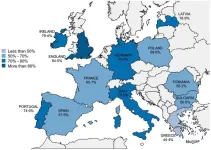(Press-News.org) The increased use of a chemical compound to replace TNT in explosive devices has a damaging and long lasting effect on plants, new research has shown.
In recent years, TNT has started to be replaced with DNAN, but until now very little was known about how this substance impacts the environment and how long it can remain in the soil.
Researchers at the University of York have been studying the environmental impact of the explosive, TNT, for more than a decade. They have shown that the chemical compound, which is used by the military around the world, remains in the roots of plants where it inhibits growth and development.
Now a new study, led by Professor Neil Bruce at the University of York’s Department of Biology and Director of the Centre for Novel Agricultural Products (CNAP), however, has shown that DNAN has similar effects to TNT, but accumulates throughout the plant and lingers for longer.
Professor Neil Bruce said: “Similarly to TNT, DNAN reacts with a key plant enzyme, generating reactive superoxide, which is highly damaging to cells. Over the course of our research we have genetically engineered plants to successfully detoxify land contaminated with munitions.
“Unfortunately DNAN is a very different story to TNT, as it accumulates in the above ground parts of the plant. While plants can use natural processes to reduce the toxicity of TNT, our studies found that plants appear to have no natural way of fighting off the toxic effects of DNAN, meaning that it persists in the plant and is toxic at much lower concentrations.”
Researchers warn that as DNAN is present throughout the plant and not just the root system, as is the case with TNT, there is a greater risk of animals eating the infected plant, introducing the toxin into the food chain.
In previous studies by the York team, genetically modified grass was grown on land contaminated with military explosives, which successfully degraded contaminants to non-detectable levels in their plant tissues, but as yet there is currently no such method to remove or reduce DNAN.
The US is estimated to have over 10 million hectares of military land contaminated with constituents of explosives and the US government estimates that remediation of unexploded ordinances on US military training ranges alone will cost $16-165 billion.
Dr Liz Rylott, co-author of the study from the University of York’s Department of Biology, said: “Recent years have seen an escalation in military explosives due to global conflicts, and so we are potentially looking at vast scales of pollution, which means there is an urgent need, and interest in, developing sustainable plant-based remediation strategies.
“We also don’t know what the limits of DNAN toxicity are in humans, so our hope is that our latest research will highlight that more work is urgently needed to understand its effects.”
This research, published in the journal Nature Plants, was funded by the Strategic Environmental Research and Development Program (SERDP) of the U.S. Department of Defense and was in collaboration with researchers at the U.S. Army Engineer Research and Development Center (ERDC), U.S. Army Corps of Engineers.
END
Chemical replacement of TNT explosive more harmful to plants, study shows
2024-11-28
ELSE PRESS RELEASES FROM THIS DATE:
Scientists reveal possible role of iron sulfides in creating life in terrestrial hot springs
2024-11-28
An international team of scientists recently published a study highlighting the potential role of iron sulfides in the formation of life in early Earth’s terrestrial hot springs. According to the researchers, the sulfides may have catalyzed the reduction of gaseous carbon dioxide into prebiotic organic molecules via nonenzymatic pathways.
This work, which appeared in Nature Communications, offers new insights into Earth’s early carbon cycles and prebiotic chemical reactions, underscoring the significance of iron sulfides in supporting the terrestrial hot ...
Hormone therapy affects the metabolic health of transgender individuals
2024-11-28
New research from Karolinska Institutet shows that long-term sex hormone treatment in transgender individuals can lead to significant changes in body composition and risk factors for cardiovascular disease, particularly in transgender men. The study is published in the Journal of Internal Medicine.
“We saw that transgender men treated with testosterone increased their muscle volume by an average of 21 percent over six years, but also that the amount of abdominal fat increased by 70 percent,” says Tommy Lundberg, docent at the Department of Laboratory Medicine, Karolinska Institutet. “In addition, they had more liver ...
Survey of 12 European countries reveals the best and worst for smoke-free homes
2024-11-28
Seven out of ten homes in Europe are smoke-free, according to a major survey published today (Thursday) in ERJ Open Research [1]. However, some countries have come further than others in protecting children and adults from second-hand tobacco smoke in the home.
Greece came out bottom of the 12 countries in the survey, with smoking allowed in more than half of homes. In Romania, Bulgaria and Spain more than four in ten homes allow smoking to take place. England scored the highest out of the 12, with more than eight in ten homes smoke-free, with Ireland, Latvia and Italy following next.
The researchers say that the ...
First new treatment for asthma attacks in 50 years
2024-11-28
An injection given during some asthma and COPD attacks is more effective than the current treatment of steroid tablets, reducing the need for further treatment by 30%.
The findings, published today in The Lancet Respiratory Medicine, could be “game-changing” for millions of people with asthma and COPD around the world, scientists say.
Asthma attacks and COPD flare-ups (also called exacerbations) can be deadly. Every day in the UK four people with asthma and 85 people with COPD will tragically die. Both conditions are also very common, in the UK someone has an asthma attack every ...
Certain HRT tablets linked to increased heart disease and blood clot risk
2024-11-28
Certain hormone replacement therapy (HRT) tablets containing both oestrogen and progestogen are associated with a higher risk of heart disease and rare but serious blood clots known as venous thromboembolism (VTE) in women around the age of menopause, finds a study from Sweden published by The BMJ today.
Another HRT tablet called tibolone was associated with an increased risk of heart disease, heart attack and stroke, but not blood clots, “highlighting the diverse effects of different hormone combinations and administration methods on the risk of cardiovascular disease,” say the researchers.
HRT is used to relieve menopausal ...
Talking therapy and rehabilitation probably improve long covid symptoms, but effects modest
2024-11-28
Cognitive behavioural therapy (CBT) and a programme of physical and mental rehabilitation probably improve symptoms of long covid, but the effects are modest, finds a review of the latest evidence published by The BMJ today.
Intermittent aerobic exercise also probably improves physical function compared with continuous aerobic exercise. But the researchers found no compelling evidence to support the effectiveness of other interventions, including certain drugs, dietary supplements, inspiratory muscle training, transcranial ...
Ban medical research with links to the fossil fuel industry, say experts
2024-11-28
An investigation published by The BMJ today reveals the extent of fossil fuel industry involvement in medical research, leading to fresh calls for academics and publishing companies to cut ties with companies.
An analysis by journalists Hristio Boytchev, Natalie Widmann and Simon Wörpel found that over the past six years, more than 180 medical articles have acknowledged fossil fuel industry funding, and an additional 1000 articles feature authors who worked for a fossil fuel company or related organisation.
While many studies don’t have an obvious link with fossil fuel industry interests, experts told The BMJ that publishing research ...
Different menopausal hormone treatments pose different risks
2024-11-28
Researchers at Uppsala University have analysed the effects of seven different hormone treatments for menopausal symptoms on the risk of blood clots, stroke and heart attack. The study, which involved around one million women aged between 50 and 58, shows that the risks differ depending on the active substance and how the medicine is taken. Published in the scientific journal BMJ, this is the largest and most comprehensive study of currently prescribed hormonal substances in the world.
“There is concern among women that menopausal hormone therapy increases the risk of cardiovascular disease. This concern is based on older studies conducted more than ...
Novel CAR T cell therapy obe-cel demonstrates high response rates in adult patients with advanced B-cell ALL
2024-11-27
Patients with relapsed or refractory CD19-positive B-cell acute lymphoblastic leukemia (ALL) who were treated with the novel anti-CD19 chimeric antigen receptor (CAR) T cell therapy, obecabtagene autoleucel (obe-cel), experienced high response rates and most did not need a subsequent stem cell transplant (SCT), according to results from the Phase Ib/II FELIX trial co-led by researchers at The University of Texas MD Anderson Cancer Center.
The findings, published today in the New England Journal of Medicine, ...
Clinical trial at Emory University reveals twice-yearly injection to be 96% effective in HIV prevention
2024-11-27
For oral medications that prevent new HIV infection to be effective, the patient must take certain actions, including attending doctor’s visits every three months and – most importantly – consistency.
These daily oral antiretrovirals, more commonly referred to as PrEP (pre-exposure prophylaxis), such as Truvada®, are extremely effective at HIV prevention, but only if they are taken daily as directed. Truvada’s efficacy is greatly compromised when taken inconsistently.
However, results from a recent Gilead-funded clinical trial (Purpose-2) led by physicians at Emory University ...



